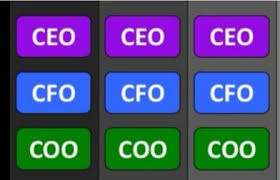How to Choose Between a CEO vs CFO Career: Roles, Skills & Key Differences
How to Choose Between a CEO vs CFO Career: Roles, Skills & Key Differences

Accounting
In the world of corporate leadership, two of the most critical roles are the Chief Executive Officer (CEO) and Chief Financial Officer (CFO). Both are part of the C-suite and are essential to a company’s strategy, performance, and growth. But while their titles may sound similar, their roles, responsibilities, and required skills differ greatly.
Whether you're considering a career path in executive leadership or you're trying to understand how these roles contribute to a company’s success, it’s essential to examine what sets a CEO apart from a CFO. This article explores the key differences between the CEO and CFO roles, including their responsibilities, qualifications, career paths, and future outlook in today’s evolving business environment.
What is a CEO?
The Chief Executive Officer (CEO) is the highest-ranking executive in a company. They are responsible for the overall direction, vision, and strategic leadership of the organization. CEOs oversee every aspect of business operations, from high-level decision-making to aligning all departments with the company's long-term goals.
CEOs work closely with the board of directors and often serve as the face of the company to investors, stakeholders, the media, and the public. Their focus is typically broad, covering all functional areas such as marketing, operations, finance, innovation, and human resources.
Key duties of a CEO include:
-
Developing and communicating the company’s vision and mission
-
Making major corporate decisions
-
Managing overall operations and resources
-
Acting as the primary point of contact between the board and management
-
Representing the company in public and private forums
What is a CFO?
The Chief Financial Officer (CFO), on the other hand, is primarily responsible for managing the financial health of the organization. They report directly to the CEO and are often seen as the second-most powerful executive in the company. The CFO’s role is focused on financial planning, budgeting, cash flow management, reporting, risk management, and strategic financial decision-making.
CFOs play a critical role in ensuring that the company remains financially sustainable, compliant with regulations, and capable of funding its growth initiatives.
Key duties of a CFO include:
-
Preparing financial statements and forecasts
-
Monitoring cash flow and financial performance
-
Conducting risk assessments and implementing controls
-
Overseeing budgeting, tax planning, and investments
-
Advising the CEO and board on financial strategy
CEO vs CFO: Key Differences in Responsibilities
While both CEOs and CFOs operate at the executive level, their core responsibilities differ significantly:
CEO vs CFO: Differences in Skills and Qualifications
To pursue a career as either a CEO or CFO, candidates must possess unique skill sets and educational backgrounds. Here's a breakdown:
CEO Skills and Qualifications:
-
Visionary thinking and strong leadership
-
Strategic decision-making across departments
-
Excellent communication and interpersonal abilities
-
Broad business knowledge (e.g., marketing, HR, operations)
-
Often holds a degree in business, management, or an MBA
CFO Skills and Qualifications:
-
Strong analytical and financial modeling skills
-
Expertise in accounting, finance, and budgeting
-
Attention to detail and regulatory compliance
-
Risk assessment and cost control
-
Usually holds a degree in finance or accounting, often with a CPA, CFA, or MBA
Career Path: CEO vs CFO
How do professionals typically ascend to CEO or CFO roles?
CEO Career Path:
Most CEOs begin in general management, marketing, operations, or business development. They often gain experience across multiple departments and rise through the ranks via leadership positions such as General Manager, Vice President, or Chief Operating Officer (COO).
CFO Career Path:
CFOs typically start in accounting, auditing, or financial analysis. Common stepping stones include roles such as Financial Analyst, Controller, Finance Manager, and Director of Finance, followed by senior roles like VP of Finance or Treasury Director.
While CEOs and CFOs may take different paths, both require extensive experience, proven leadership, and a deep understanding of their respective areas of expertise.
CEO vs CFO Salary Trends
Both CEO and CFO positions are among the highest-paid roles in any organization, but salaries can vary depending on location, company size, and industry.
Average Annual Salaries in 2024:
Note: CEO salaries often include equity, stock options, and bonuses, which can significantly increase total compensation.
Can a CFO Become a CEO?
Yes, it’s increasingly common for CFOs to become CEOs, especially in companies where financial performance and strategy are core to the business. CFOs already possess strong analytical skills, understand business performance metrics, and often have experience in boardroom-level communication.
To transition successfully, CFOs must expand their leadership scope, sharpen their operational expertise, and cultivate a more visionary, growth-oriented mindset beyond financials.
The Evolving Roles of CEO and CFO in the Digital Age
Digital transformation is reshaping the corporate landscape, impacting how CEOs and CFOs operate. Both must embrace innovation, data-driven decision-making, and digital technologies.
Modern CEOs must:
-
Lead with agility in fast-changing markets
-
Foster innovation through tech adoption
-
Emphasize sustainability and ESG initiatives
Modern CFOs must:
-
Utilize financial technology (fintech) to improve reporting and forecasting
-
Implement AI for automated financial analysis
-
Ensure cybersecurity and compliance in a digital environment
Collaboration between the CEO and CFO is critical to align strategy with financial execution.
Which Role Is Right for You?
If you're considering a future in executive leadership, understanding which role best suits your skills and aspirations is key.
Choose a CEO path if:
-
You're a visionary with a passion for innovation and strategy
-
You enjoy working across multiple business functions
-
You're comfortable making bold, high-stakes decisions
Choose a CFO path if:
-
You’re analytical and detail-oriented
-
You enjoy working with numbers and financial data
-
You prefer supporting strategic decisions with financial insight
Both roles are critical and choosing the right one depends on your strengths, goals, and long-term career vision.
While the CEO and CFO work hand-in-hand to ensure an organization’s success, their roles are distinct in focus, responsibilities, and skills. CEOs guide the overall direction and growth of a company, while CFOs safeguard its financial health and ensure strategic fiscal planning. As businesses grow more complex and technology-driven, the partnership between the CEO and CFO is more important than ever.
Whether you aspire to become a CEO or CFO, a clear understanding of each role will empower you to chart a successful executive career path and make a meaningful impact in any organization.
Suggested Next Reads:
-
Financial Controller vs CFO: Key Differences Explained
-
How to Become a CFO: Career Path, Skills, and Salary Insights
Related Articles
Explore Articles on Finance, Accounting, and Career Growth


